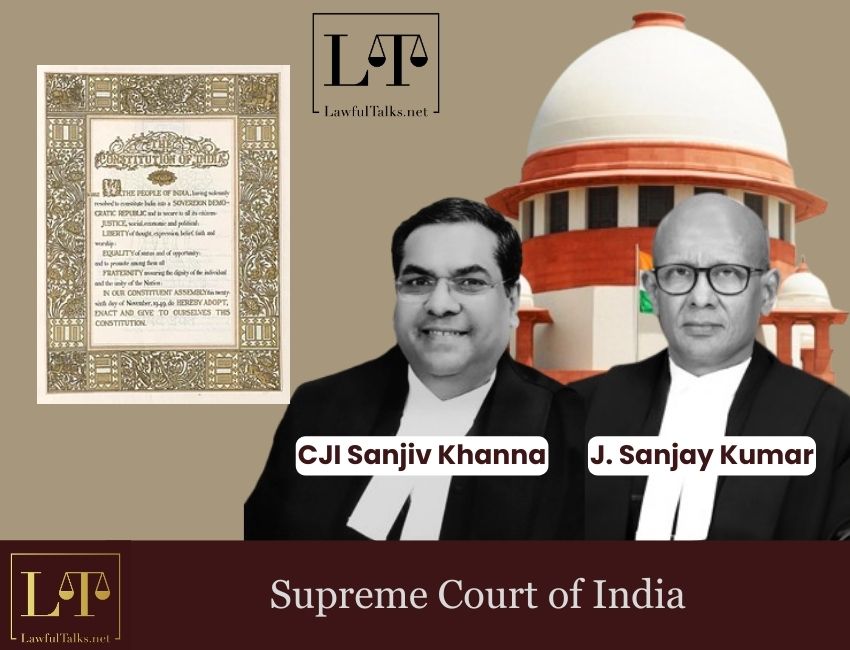Allahabad HC Sets Aside Afzal Ansari's Conviction, Allows Him to Continue as MP

On November 25, 2024, the Supreme Court of India division bench comprising CJI Sanjiv Khanna and Justice Sanjay Kumar dismissed Writ Petitions (Civil) Nos. 645 of 2020 and 1467 of 2020, which challenged the inclusion of the words ‘socialist’ and ‘secular’ in the Preamble to the Constitution through the 42nd Amendment.

The petitions raised arguments regarding retrospectivity, historical intent, and the alleged invalidity of the amendment due to its passage during the Emergency period in 1976. The Court's dismissal reaffirmed the constitutionality of the amendment and underscored the dynamic nature of the Indian Constitution.
The petitioners contended that the inclusion of ‘socialist’ and ‘secular’ in the Preamble was unconstitutional for several reasons. They argued that the words were deliberately excluded by the Constituent Assembly in 1949, and their retrospective application created a “falsity.” Additionally, the amendment's passage during an extended Lok Sabha tenure post-Emergency allegedly undermined its legitimacy.
In dismissing these claims, the Court emphasised:
“The Constitution is a living document, with power given to the Parliament to amend it in terms of and in accord with Article 368.”
This power, the Court clarified, extends to the Preamble, which embodies the essence of constitutional values. The mere fact that the Constitution was adopted in 1949 does not limit the Parliament’s amending authority. The argument of retrospectivity was deemed untenable, as it could apply to any constitutional amendment and did not negate the Parliament’s powers under Article 368.
The Supreme Court highlighted the evolving interpretation of secularism, describing it as:
“A principle wherein the State neither supports any religion nor penalizes the profession and practice of any faith.”
Articles 14, 15, 16, 25, and 26 collectively enshrine secular values, ensuring equality and freedom of religion. The Court referenced prior landmark judgements, including Kesavananda Bharati v. State of Kerala and S.R. Bommai v. Union of India, reiterating that secularism forms a basic feature of the Constitution. The Court elaborated:
“The concept of secularism represents one of the facets of the right to equality, intricately woven into the basic fabric that depicts the constitutional scheme's pattern.”
Similarly, the Court clarified the meaning of ‘socialist’ in the Indian framework:
“Socialism embodies the principle of economic and social justice, wherein the State ensures that no citizen is disadvantaged due to economic or social circumstances.”
Rejecting claims that socialism restricts economic policies, the Court noted that it reflects India’s welfare-oriented approach rather than a rigid economic ideology.
A critical factor in the Court’s dismissal was the significant passage of time since the amendment. The judgement stated:
“The fact that the writ petitions were filed in 2020, forty-four years after the words ‘socialist’ and ‘secular’ became integral to the Preamble, makes the prayers particularly questionable.”
The Court observed that these terms had been embraced by the people of India and had not impeded governance or policy-making.
Case Details: Dr Balram Singh & Ors. v. Union of India & Anr., W.P. (Civil) No. 645 of 2020 (Tap for the Judgement)
(For more updates, tap to join us on Whatsapp, Facebook, Instagram and LinkedIn)

Sonam Pandey
Law Student
Latest Posts
Categories
- International News 19 Posts
- Supreme Court 352 Posts
- High Courts 367 Posts





























































































































































































































































































































































































































































































































































































































































































































































